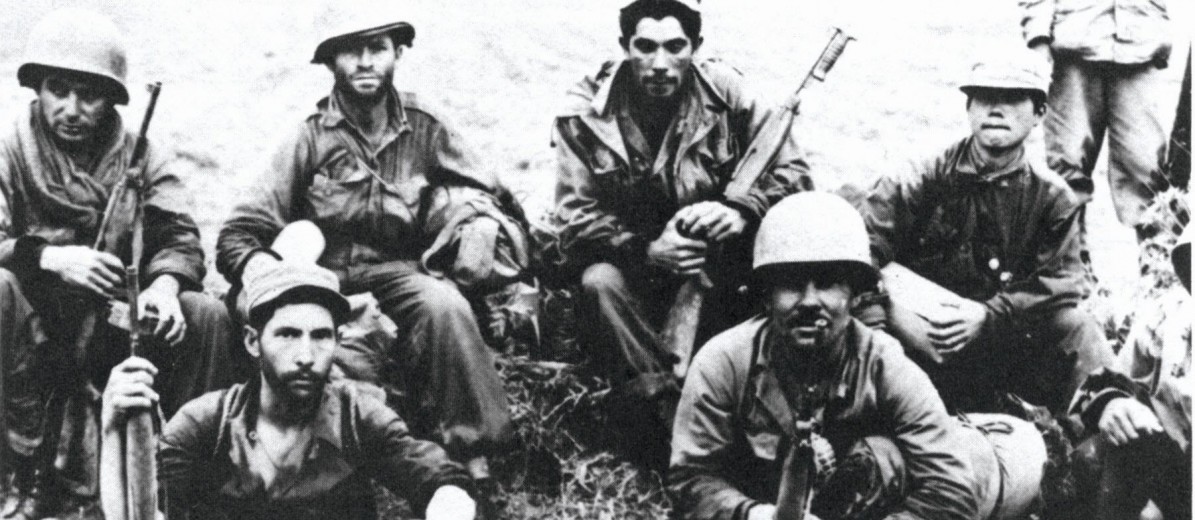I’ve come to say goodbye to the boys
Because I am off to war
And even if I fight in faraway lands
I am fighting for my rights, my homeland and my honor
These are the lyrics to an original song performed by boricua cuatro guitar player Marcos Melendez in the PBS documentary, Latinos in America. Melendez is not only a musician; he is also a World War II veteran and former member of an exclusively Puerto Rican military unit of the U.S. Army, the 65th Regiment, also known as the Borinqueneers.
In the film, Melendez shares how he used this particular song to boost his fellow soldiers’ morale while on a ship en route to an overseas battle. “I grew up in the Army. [The Army] made me a better man,” he adds. In recognition of Memorial Day, ‘LLERO honors the Borinqueneers.
The Unit is Born
The first ever Puerto Rican military group was established in 1899 by an Act of Congress, which authorized the “Porto Rico Battalion of Volunteer Infantry.” The volunteers were officially made part of the U.S. military in 1908. After the passage of the Jones Act in 1917, which granted Puerto Ricans citizenship, even more men joined the army. The 65h Infantry Regiment, the last segregated unit of the Army, was officially established on September 14, 1920 after successfully protecting the Panama Canal.
Puerto Ricans had been volunteering for military service to prove their patriotism and for a better quality of life for themselves and their families for decades. Melendez says he enlisted in 1939 for the promise of “better food, more money and good living.” Up until that point the Puerto Rican servicemen were given the moniker “Borinqueneer” which derives from the Taino word for the island, “Borinquen”. The 65th Infantry Regiment consisted of Puerto Rican men who saw frontline action in World War I, World War II and The Korean War. It wasn’t until March 1953 during the Korean War that the unit diversified, adding Mexican-American, Filipinos, African-American and other Caribbean soldiers.
The Glory Days
Armed with the regiment motto “Honor and Fidelity” as their moral compass, the Borinqueneers achieved a myriad of accomplishments. Over 65,000 Latinos served in World War II and the majority hailed from the 65th Regiment. For their bravery, members would earn numerous Silver and Bronze Stars, as well as the Purple Heart. A pivotal military exercise on the island of Vieques dubbed “PORTREX” or Puerto Rico Exercise was crucial to their success. After defending the island against 32,000 troops on the ground, the Borinqueneers proved they were a force to be reckoned with. This coup would deploy the regiment to Korea in 1950. Just a year later in 1951 General Douglas McArthur praised the unit for their bravery at the onset of the Korean War. MacArthur once wrote of the unit: “I am indeed proud to have them under my command,” he once wrote. “I wish we could count on many more like them.”
The Bloody Battle
The Borinqueneers enjoyed triumphs and endured loss over the course of the Korean War. According to the Korean War Casualty file, 2,771 Purple Heart Awards were given to members of the 65th Regiment. The regiment is most known for the successful bayonet assault of North Korean troops in December 1950. They also were praised for protecting the Third Division in February 1951. Despite their courage in over nine different battles, in 1953, 915 soldiers were court martialed and charged with “desertion”. The government and public were outraged and demanded an explanation. The US Army backed down and admitted that issues within the unit, including a change of commanders, a language barrier and decreasing morale, led to a breakdown in the troop. The Army quickly overturned all of the sentences. The Korean War would go down as one of the bloodiest battles in Puerto Rican military history with 750 casualties reported. By the end of the war, the Puerto Rican soldiers were integrated into the general Army population.
Today, The Borinqueneers Congressional Gold Medal Alliance, a volunteer organization, is dedicated to honoring the 65th Regiment’s legacy. The Congressional Gold Medal is the highest civilian award given to persons
“who have performed an achievement that has had an impact on American history and culture.”
If you want to honor the Borinqueneers, or simply learn more visit www.65thcgm.org.
Photo property of El Pozo Productions

